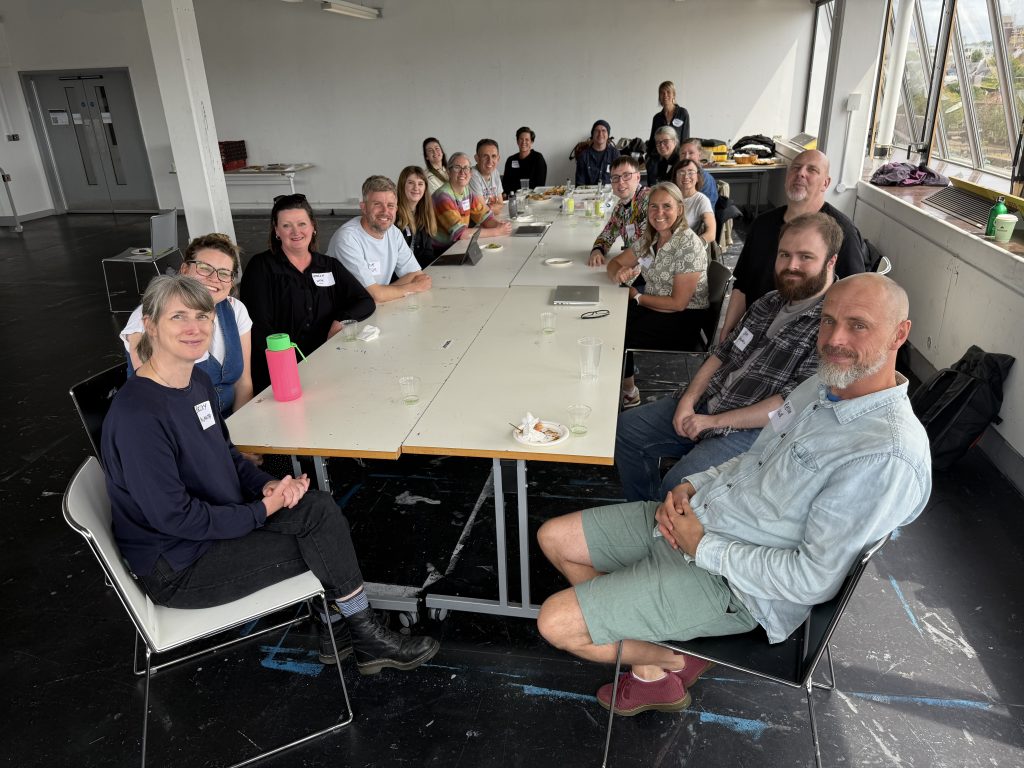My journey through the CHEAD Technical Leadership Programme
Alice Strotten, Falmouth University
Last Summer, my manager kindly shared a link to the CHEAD technical leadership programme and asked if I’d like to apply. I had been in my job as a technical store manager for the campus for just over a year. The role was new; there had been a team of store assistants, but without a designated store manager. The store was growing quickly, both in bookings and student usage, as well as an increase in staffing numbers. This new role felt like a significant change from my previous one, where I had been helping implement the University’s stores’ booking system as part of the digital projects team.
I stepped into this role as a first-time young female manager, which was both exciting and intimidating. In meetings, I was often the youngest in the room, sometimes the only woman, and I was juggling leadership expectations while still growing my own confidence.
When I joined the programme, I wasn’t sure what to expect. I hoped to gain practical tools, maybe sharpen my strategic thinking. The programme helped me recognise that leadership isn’t about having all the answers—it’s about curiosity, communication, and clarity of purpose. I learned how to better support my team, how to navigate complex conversations with senior stakeholders, and how to think more holistically about the technical challenges we face.
As a young manager, I often found myself second-guessing whether I was doing enough or doing it “right”. This course helped me gain frameworks and strategies that I now use every day. It was empowering to learn that leadership can look different for everyone, and that my own approach is valid and valuable.

CHEAD Technical Alliance Leadership Programme 2024-25
The Joy of Connecting with Others
One of the aspects I enjoyed most about the programme was the opportunity to network with others in my field. Meeting peers from across the sector, all facing similar challenges and asking similar questions, was both grounding and energising. It reminded me that I’m not alone in this journey, and that there’s strength in sharing ideas and learning from one another.
It was surprising and comforting to know that a lot of the difficulties I was facing were so similar to others. At the same time, it was great to see and meet such a vast cross-section of ages, backgrounds, and experiences in the room. Some had no experience of managing a team or project, but were aspiring leaders, whilst others had climbed quite high up the technical university ladder. Even those with much experience I felt gained something from the course.
One of the most valuable aspects of the course was having a mentor for the year. My mentor’s positive, people-focused approach helped me realise I wasn’t delegating effectively. I used to think it was quicker to handle even simple tasks myself, but I’ve learned that true team growth comes from letting go. Even if tasks take longer, look different, or involve mistakes along the way, delegating gives others the chance to learn, take ownership, and feel more satisfied in their roles, while allowing me to better prioritise my own work.
The connections I made continue to be a source of support and inspiration. Whether we’re discussing leadership dilemmas, swapping technical insights, or just cheering each other on, the network I built through this programme has become a vital part of my professional growth.
Exploring the Sector: Touring Other Arts Universities
Another highlight of the programme was the opportunity to tour other arts universities across the UK. It’s easy to become focused on the day-to-day of your own institution, but visiting other campuses gave me a broader perspective on the creative education landscape. It was fascinating to see how different teams approached challenges, where they were investing in technology, and how facilities were being adapted—either expanded, combined, or narrowed. These visits sparked new ideas for my own work and reminded me why I’m passionate about working at the intersection of creativity, technology, and education.
What the programme looked like
One of the great aspects of the programme was the chance to hear inspiring presentations from experienced professionals in the field. Topics included how to influence different stakeholders, explore various career development pathways, and manage your own wellbeing to avoid burnout.
The first two sessions, held in October and February, focused on these talks and presentations. The third session in June, however, shifted the spotlight to us. Throughout the year, we had been working in pairs to prepare a 15-minute presentation, which we then shared with the group. I’ll admit—I was hesitant and nervous at first. But it was reassuring to see that everyone felt the same way. In the end, presenting was a huge relief and incredibly rewarding. The atmosphere was so encouraging, and the feedback was overwhelmingly positive. It was especially meaningful to hear how others connected with the challenges I had faced—and continue to work through—as I grow professionally.
Final Thoughts
Attending this Technical Leadership Programme has been a milestone in my career. It gave me practical tools, a new sense of self-assurance, a wider professional network, and a fresh appreciation for the broader creative education landscape.
If you’re a young manager—especially a woman—wondering if you’re ready for leadership: you are. Seek out these opportunities. Invest in your growth. And most importantly, believe that your leadership matters.
Find out more about the CHEAD Technical Alliance Leadership Programme
